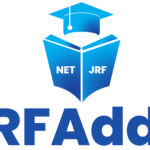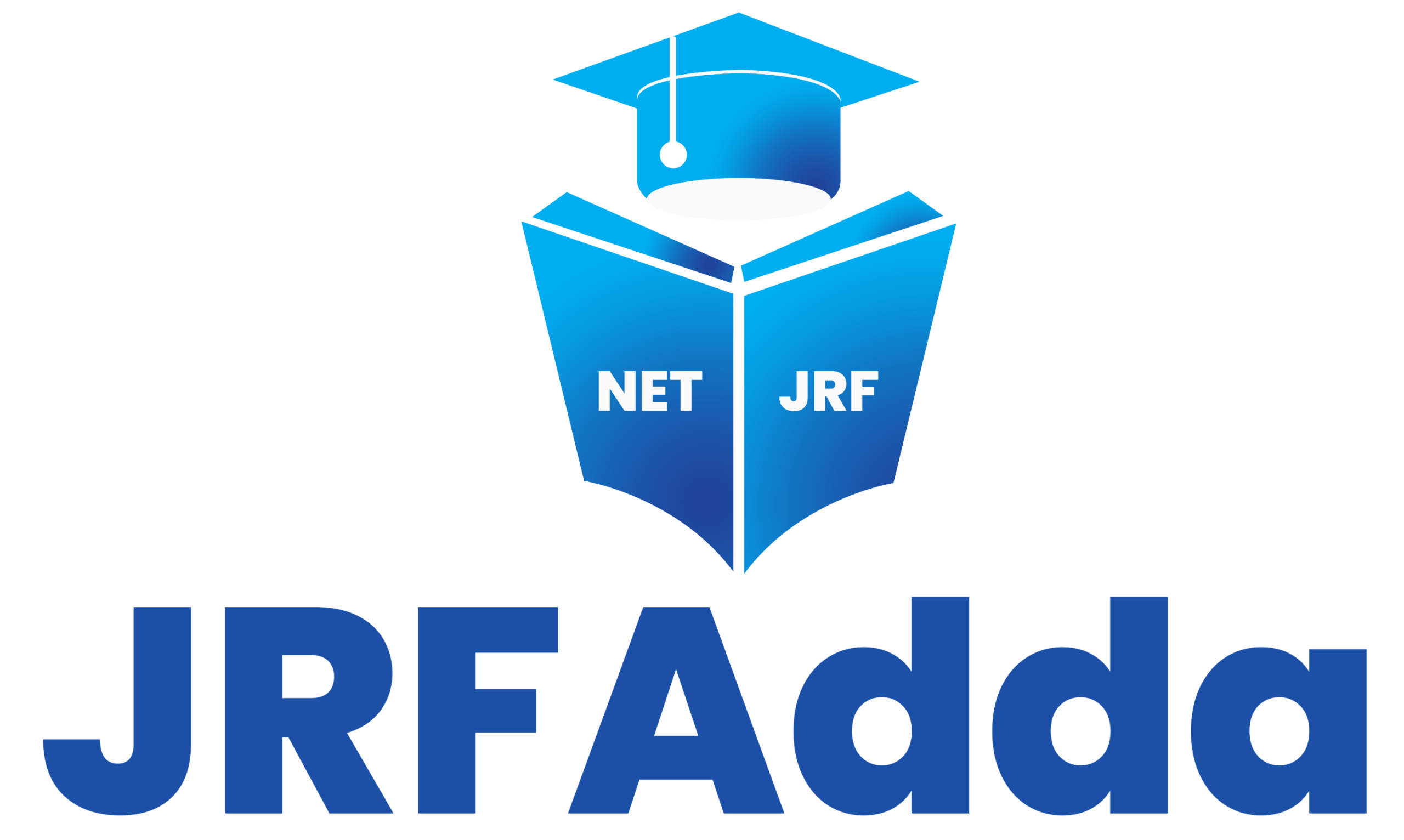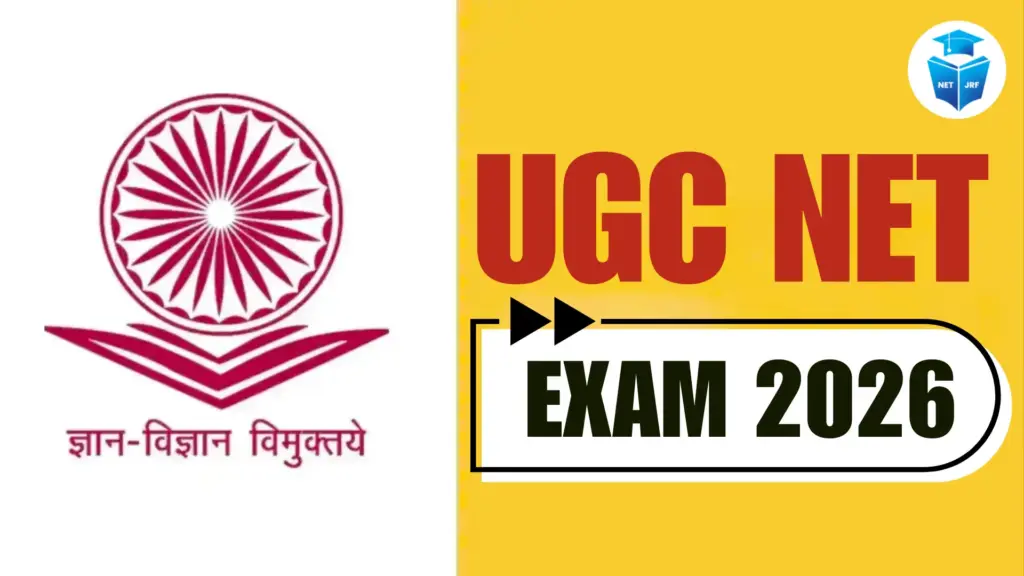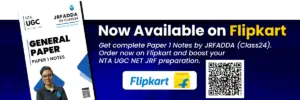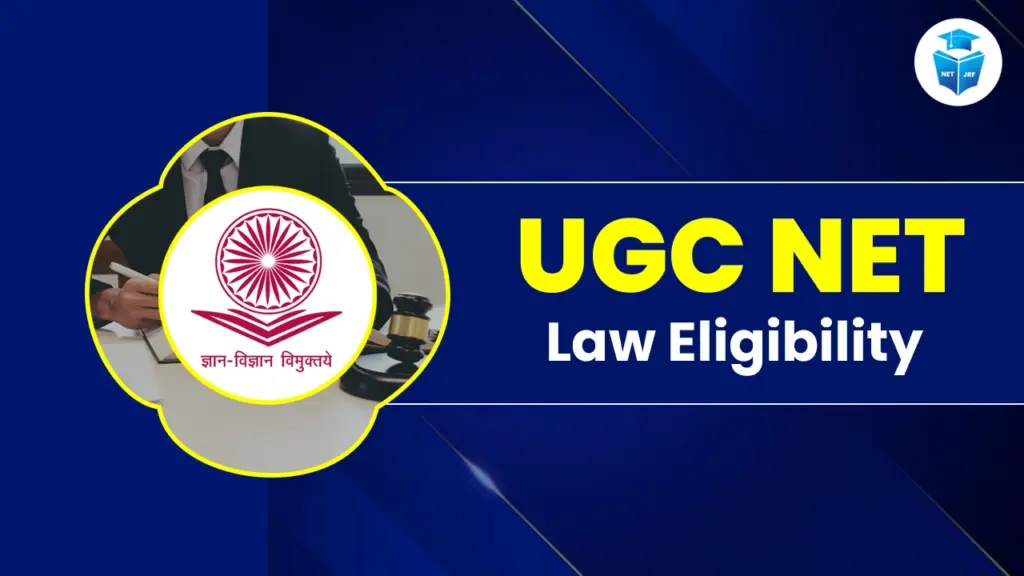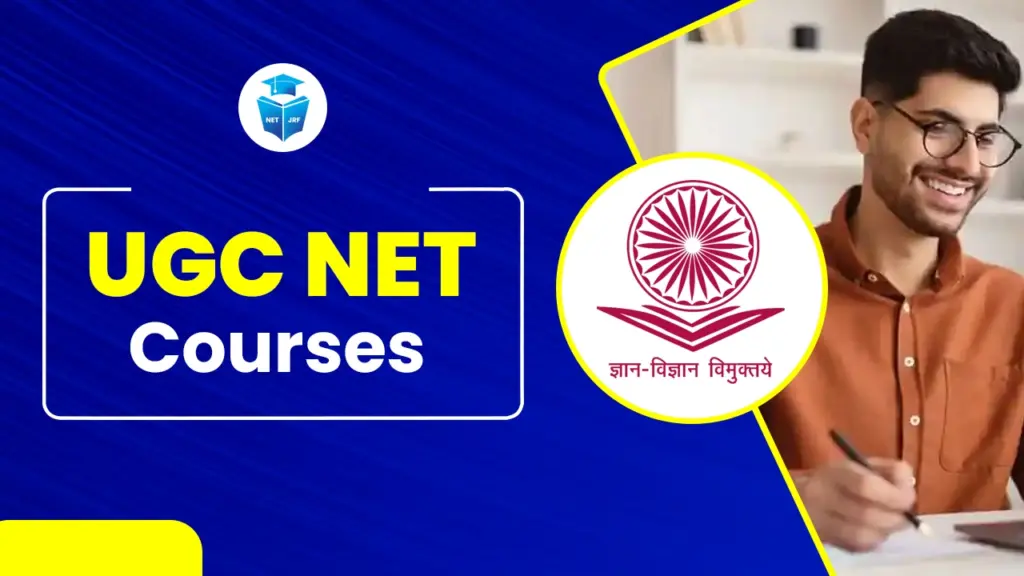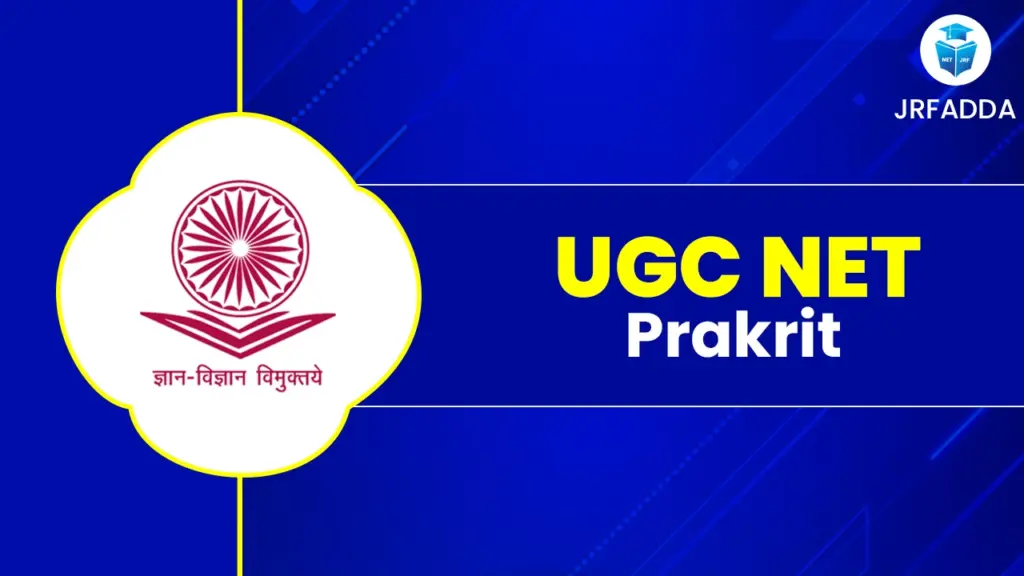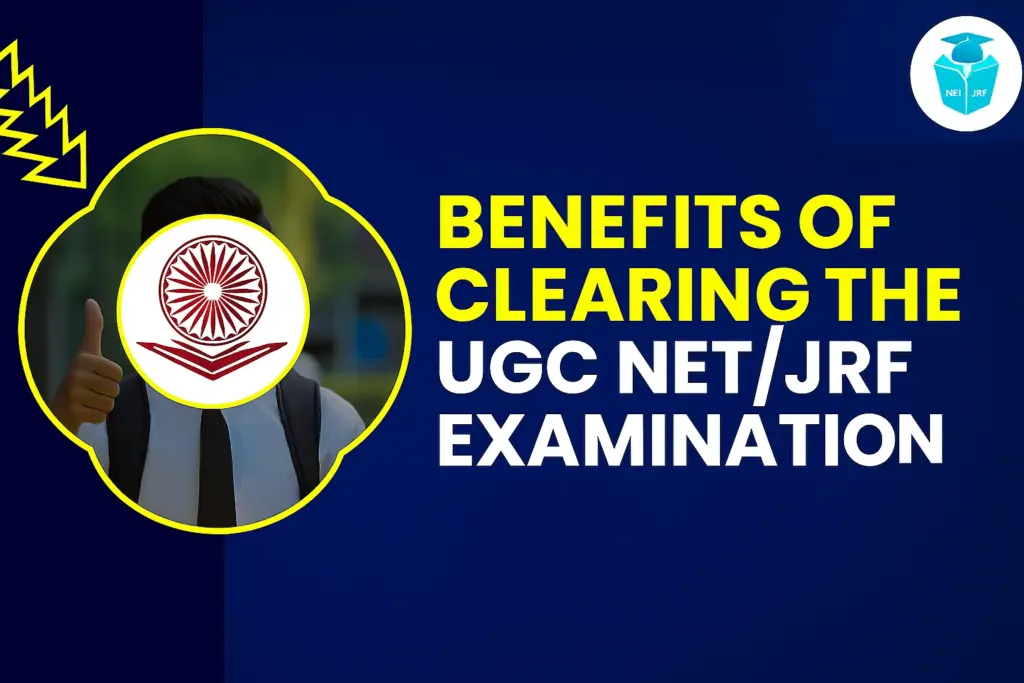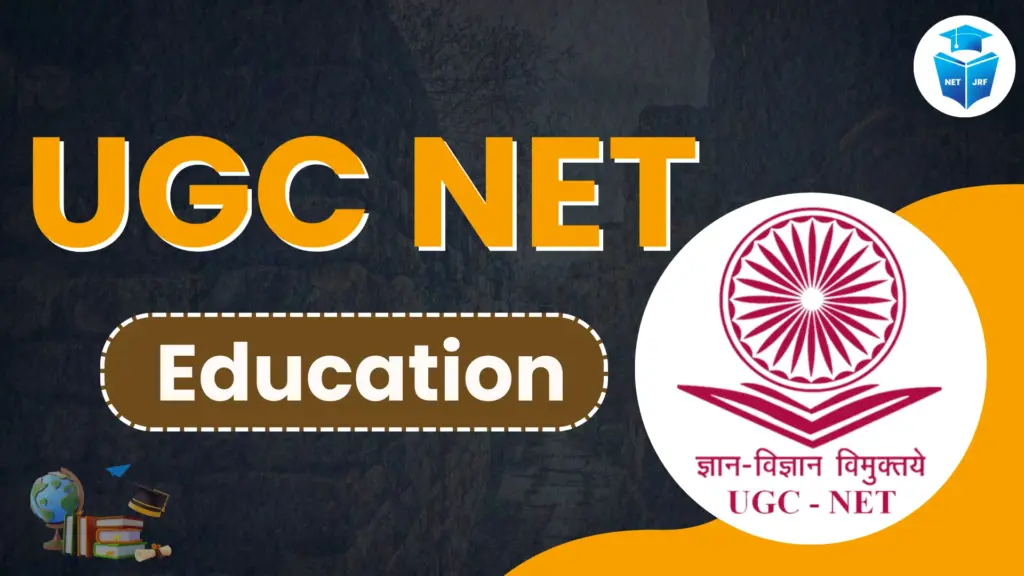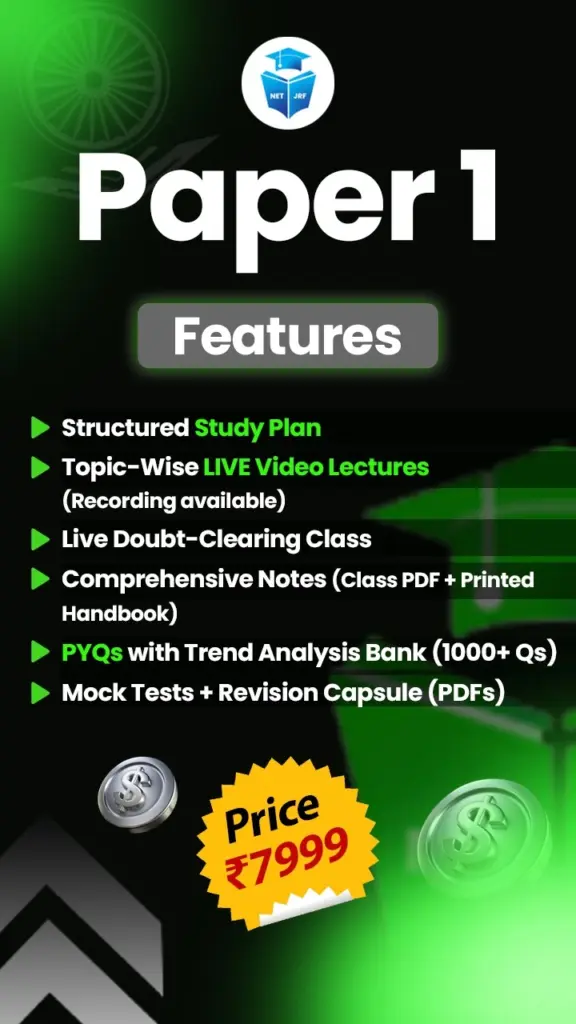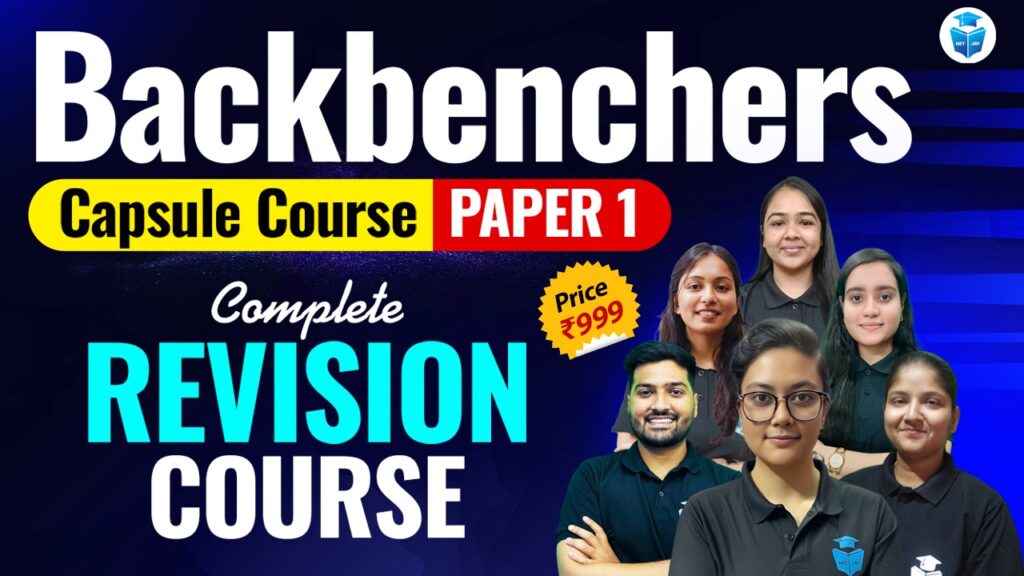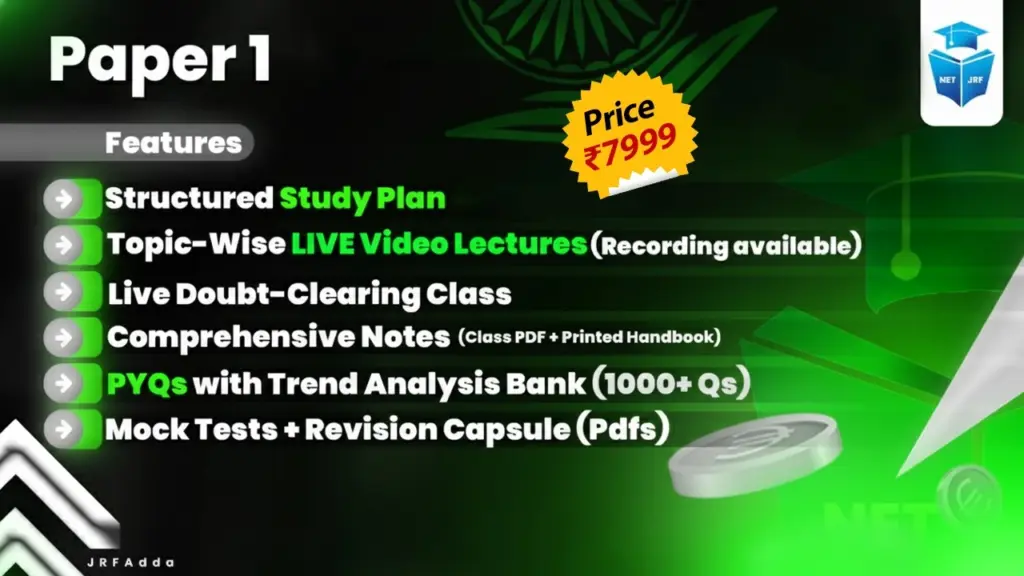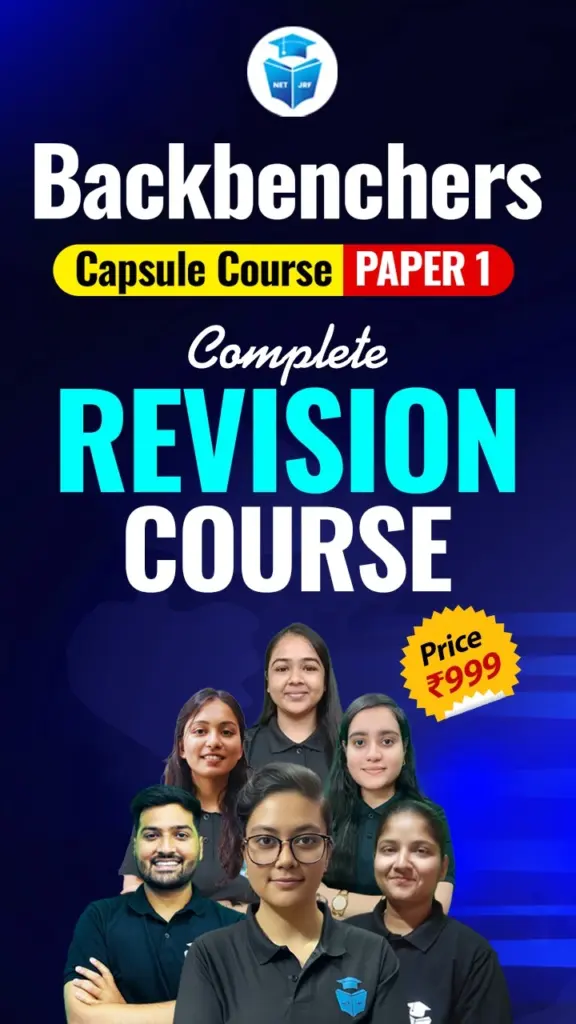UGC NET Exam 2026 is a competitive national examination conducted by the National Testing Agency (NTA) on behalf of the University Grants Commission (UGC) to determine eligibility for Assistant Professor posts and for Junior Research Fellowship (JRF) in Indian universities and colleges.
Since the UGC NET application process 2026 for the upcoming June session examination will start soon, the candidates must shift their entire focus towards preparing for the UGC NET June 2026 examination, which will be conducted at various exam centres across India from 25 June to 29 June 2026 (Tentative).
Explore the article for all important details regarding the UGC NET June 2026 Application Form, eligibility, syllabus, exam pattern, marking scheme, UGC NET exam date 2026, and UGC NET admit card 2026 release date for the June 2026 cycle.
Also Read: UGC NET 2026
JRFAdda Premium June 2026 UGC NET Paper-1 Batch- Join Now!
UGC NET Exam 2026 Application Form
The UGC NET Exam 2026 Application Form for the session will soon be released by the National Testing Agency (NTA). The expected timeline for the release of the UGC NET June 2026 Application Form is around April 2026. Stay tuned for any further updates regarding the UGC NET Exam 2026 registration process. Start preparing for the UGC NET Exam 2026 June to succeed in claiming the roles of Assistant Professor and Junior Research Fellow (JRF).
Also Read: UGC NET Application Form 2026
UGC NET Exam 2026 Eligibility Criteria
The National Testing Agency conducts the UGC NET Exam 2026 to determine Indian nationals’ eligibility for Assistant Professor, Junior Research Fellowship (JRF) in Indian universities and colleges. Candidates must meet the following UGC NET eligibility criteria 2026 in order to apply for the exam:
UGC NET Educational Qualification 2026
Candidates must hold a postgraduate degree in a relevant field from a recognized university in order to be eligible for the UGC NET Exam 2026 June. Depending on the candidate’s category, different percentages of marks are needed. Below is a detailed overview of the UGC NET educational qualification 2026 under the UGC NET eligibility criteria 2026 for the UGC NET June 2026 session:
| Criteria | Details |
| Minimum Qualification | Master’s Degree or equivalent from a recognised university/institution |
| Minimum Marks Required | General/Unreserved/General-EWS: 55% aggregate in Master’s degree
OBC-NCL/SC/ST/PwD/Third Gender: 50% aggregate |
| Subjects Accepted | Humanities (including languages), Social Sciences, Computer Science & Applications, Electronic Science, etc. |
| Candidates in Final Year | Candidates appearing in the final year of their Master’s degree (or waiting for results) can also apply. |
Foreign Degree Holders
For the UGC NET Exam 2026, the candidates with foreign Master’s degrees should have their qualifications approved by the Association of Indian Universities.
Also Read: UGC NET Registration 2026
UGC NET Exam 2026 Age Limit
The UGC NET Exam 2026 age limit criteria differ for Junior Research Fellowship (JRF) and Assistant Professor eligibility. The table below provides the detailed UGC NET age limit criteria for the UGC NET exam 2026 June session:
| Purpose | Maximum Age |
| JRF | Not more than 30 years |
| Assistant Professor | No upper age limit |
Also Read: UGC NET Age Limit 2026
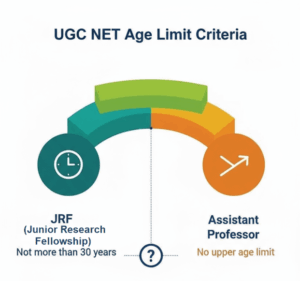
UGC NET Exam 2026 Relaxation
For candidates in reserved categories, women, and those with relevant qualifications or previous experience, the UGC NET Exam 2026 provides age relaxation. The detailed relaxation criteria for the UGC NET Exam 2026 June cycle are as follows:
| Category / Criteria | Age Relaxation | Remarks |
| OBC-NCL, SC, ST, PwD, Third Gender, Women | Up to 5 years | Cumulative, applicable even if the candidate qualifies under multiple categories |
| Candidates with research experience | Up to 5 years | Limited to actual period spent on research, subject to verification |
| Candidates with LLM degree | Up to 3 years | Additional to other applicable relaxations |
| Armed Forces personnel (Ex-servicemen) | Up to 5 years | Applicable based on duration of service in the armed forces |
Also Read: UGC NET Eligibility 2026
UGC NET Exam 2026 Exam Pattern
The UGC NET Exam 2026 consists of two papers—Paper 1 and Paper 2, which were conducted in a single session using a Computer-Based Test (CBT) format. Here’s a breakdown of the Paper 1 and Paper 2 exam format for the UGC NET Exam 2026 June session:
| Paper | Subjects Covered | No. of Questions | Total Marks | Duration |
| Paper 1 | General Aptitude (Teaching & Research) | 50 | 100 | 1 hour |
| Paper 2 | Subject-Specific (Postgraduate Specialisation) | 100 | 200 | 2 hours |
| Total | Both Papers Combined | 150 | 300 | 3 hours |
Also Read: UGC NET Exam Pattern 2026
UGC NET Exam 2026 Syllabus
The UGC NET Exam 2026 syllabus is divided into two papers. Paper 1 tests general aptitude, while Paper 2 is subject-specific and based on the candidate’s postgraduate specialization. Below is a detailed outline of the UGC NET Exam 2026 Syllabus:
UGC NET Paper 1 Syllabus (General Aptitude)
The UGC NET Exam 2026 Paper 1 assesses the candidate’s teaching and research aptitude, reasoning ability, comprehension, and general awareness. Check the UGC NET Exam Syllabus 2026 for Paper 1 in the table below:
| Unit | Topics |
| Teaching Aptitude | Nature, objectives, and characteristics of teaching; learner characteristics; methods of teaching; evaluation systems. |
| Research Aptitude | Research meaning, characteristics, and types; steps of research; methods of research; research ethics; thesis and article writing. |
| Reading Comprehension | A passage to assess analytical and interpretative skills. |
| Communication | Communication types, barriers, and effective classroom communication. |
| Mathematical Reasoning | Number series, coding-decoding, and logical sequences. |
| Logical Reasoning | Venn diagrams, syllogisms, and verbal reasoning. |
| Data Interpretation | Interpretation and analysis of data in tabular, graphical, or chart format. |
| Information & Communication Technology (ICT) | Basics of computers, the internet, e-learning, ICT tools, and governance. |
| People, Development, and Environment | Environmental issues, sustainable development, policies, and initiatives. |
| Higher Education System | Policies, governance, administration, history, and the role of higher education in India. |
Also Read: UGC NET Syllabus 2026
UGC NET Paper 2 Syllabus (Subject-Specific)
The UGC NET exam 2026 Paper 2 is based on the subject chosen by the candidate. It includes detailed topics related to their postgraduate study. Here are some examples of popular UGC NET Exam 2026 subjects:
| Subject | Key Topics |
| Economics | Microeconomics, Macroeconomics, Development Economics, International Economics, Econometrics, Business Economics |
| Political Science | Political Theory, Comparative Politics, International Relations, Indian Government and Politics, Political Institutions |
| History | Ancient, Medieval, and Modern Indian History, World History, National Movements, Colonial Economy |
| Commerce | Business Environment, Financial Management, Marketing, Accounting, Auditing, Strategic Management |
| English | Literary Movements, Major Authors (Shakespeare, Chaucer), Literary Criticism, Indian English Literature |
| Sociology | Sociological Theories, Social Change, Indian Society, Social Stratification, Research Methods |
| Philosophy | Indian Philosophy, Western Philosophy, Ethics, Logic, Metaphysics |
| Psychology | Behavioral Psychology, Cognitive Psychology, Developmental Psychology, Social Psychology, Research Methods |
| Public Administration | Administrative Theory, Indian Administration, Public Policy, Governance, Decentralization |
| Education | Educational Psychology, Curriculum Development, Educational Technology, Teacher Education |
| Anthropology | Cultural Anthropology, Physical Anthropology, Archaeology, Social Anthropology |
| Mathematics | Algebra, Real Analysis, Linear Algebra, Topology, Differential Equations, Number Theory |
| Geography | Physical Geography, Human Geography, Geographic Techniques, Environmental Geography |
| Law | Constitutional Law, Criminal Law, International Law, Human Rights, Legal Theory |
| Mass Communication & Journalism | Media Theories, Communication Models, Journalism Ethics, Mass Media Laws |
| Management | Organizational Behavior, Marketing Management, Financial Management, Human Resource Management |
| Library & Information Science | Information Sources, Cataloguing, Classification, Information Retrieval, Digital Libraries |
| Linguistics | Phonetics, Syntax, Semantics, Sociolinguistics, Psycholinguistics |
| Botany | Plant Physiology, Genetics, Taxonomy, Ecology, Molecular Biology |
| Zoology | Animal Physiology, Genetics, Evolution, Ecology, Cell Biology |
| Computer Science & Applications | Algorithms, Data Structures, Computer Networks, Database Management, Software Engineering |
| Environmental Science | Ecology, Environmental Pollution, Natural Resource Management, Environmental Laws |
Also Read: UGC NET Political Science Syllabus 2026
UGC NET Exam Syllabus 2026 PDF Download
To be able to prepare comprehensively for the UGC NET Exam 2026, the candidates must analyze the syllabus PDF. The candidates can download the official UGC NET Syllabus 2026 for both Paper 1 and Paper 2 from the link provided below:
Download UGC NET Paper 1 Syllabus PDF & UGC NET Paper 2 Syllabus PDF
UGC NET Marking Scheme 2026
The UGC NET Exam 2026 exam follows a clear and straightforward marking system, and the mode of examination is a Computer-Based Test (Online). Check out the UGC NET Marking Scheme 2026 below:
| Aspect | Details |
| Correct Answer | +2 marks for each correct answer |
| Incorrect Answer | No negative marking for incorrect answers |
| Total Marks | 300 marks (100 for Paper 1, 200 for Paper 2) |
| Mode of Examination | Computer-Based Test (CBT) |
| Question Type | Objective (Multiple-Choice Questions) |
| Language | Bilingual (English and Hindi) |
| Session | Single session for both papers |
UGC NET Admit Card Download PDF 2026
UGC NET Admit Card 2026 for the June session will be officially released by the NTA, expectedly in the 3rd week of June 2026. The aspirants can check their UGC NCT exam City 2026, the centre name, exam day guidelines and the shift timing in the UGC NET Admit Card 2026 once issued. Access the UGC NET Admit Card 2026 subject wise PDF for the June session from the link provided ahead:
UGC NET Admit Card Download PDF 2026 for June Session- Available Soon
Also Read: UGC NET Admit Card 2026
UGC NET Exam Date 2026
The National Testing Agency (NTA) will announce the official UGC NET Exam Date 2026 for the June session. The UGC NET Exam 2026 will be conducted in computer-based test (CBT) mode at multiple exam centres across India. Check the tentative dates for the UGC NET 2026 Exam Date for the June session:
| Event | Exam Date December 2025 Cycle | Exam Date June 2026 Cycle (Tentative) |
| UGC NET Notification Release | 7 October 2025 | 3rd week of April 2026 |
| UGC NET Application Form Start Date | 7 October 2025 | 3rd week of April 2026 |
| UGC NET Last Date to Apply Online | 7 November 2025 (until 11:59 PM) (Closed) | 3rd week of May 2026 |
| UGC NET Correction Window | 10- 12 November 2025 (until 11:59 PM) (Closed) | May 2026 |
| UGC NET Admit Card Release | 27 December 2025 | 3rd week of June 2026 |
| UGC NET Exam Date | 31 December 2025 to 7 January 2026 | 25 June – 29 June 2026 |
| UGC NET Result Declaration | 4 February 2026 | Last week of July 2026 |
Also Read: UGC NET Exam Date 2026
UGC NET Previous Year Question Papers
UGC NET Previous Year Question Papers are original questions that were asked in the previous UGC NET exams. They include UGC NET Paper 1 PYQs (Teaching & Research Aptitude — general for all) as well as UGC NET PYQs for Paper 2 (subject-related). Practising UGC NET PYQs makes you familiar with patterns and schemes in the exams, key topics, and difficulty levels. To further solidify their preparation, the candidates must analyse the UGC NET Question Paper June 2025 PDF download.
Also Read: UGC NET Previous Year Question Papers
UGC NET Exam 2026 Exam Timing
There will be two shifts per day for the Computer-Based Test (CBT) mode of the UGC NET Exam 2026. The exam shift, reporting time, and other instructions mentioned on the admit card must be understood by the candidates. Following the exam schedule exactly is essential to preventing disqualification or admission denial. The UGC NET Admit Card 2026 and a valid photo ID are among the documents that candidates should bring to the exam site well in advance of the reporting time.
Also Read: UGC NET Timing & Schedule 2026
Conclusion
UGC NET Exam 2026 is a highly significant opportunity for aspirants aiming to become Assistant Professors or pursue research through the Junior Research Fellowship (JRF) in Indian universities and colleges. The UGC NET Application process 2026 and the UGC NET 2026 exam date for the June session will be released soon. The candidates must now focus on smart revision, effective time management, mock test practice, and strengthening conceptual clarity. The candidates can supplement their preparation with the UGC NET Paper 1 PYQs and Paper 2 UGC NET Previous Year Question Papers, as well as download the UGC NET Question Paper June 2025 PDF and analyse to maximise their chances of success. For those who couldn’t qualify in the June session, this UGC NET Exam 2026 June cycle offers a fresh chance to achieve your academic goals.
UGC NET Exam 2026 FAQs
When is the UGC NET Exam 2026 scheduled to take place?
The UGC NET Exam 2026 June session will take place in computer-based test (CBT) mode, expectedly from 25 June to 29 June 2026.
Can I apply for both Assistant Professor and JRF in the UGC NET Exam 2026?
Yes, candidates can apply for both JRF and Assistant Professor, provided they meet the respective eligibility and age criteria.
What is the minimum age limit for JRF in the UGC NET Exam 2026?
The maximum age for a Junior Research Fellowship (JRF) is 30 years old. Eligibility to be an Assistant Professor has no upper age limit.
When will the UGC NET Admit Card 2026 be released?
It is expected that the UGC NET Exam 2026 Admit Card will be made available on the official NTA website during the 3rd week of June 2026.
How many times is the UGC NET 2026 conducted in a year?
UGC NET 2026 is conducted twice a year – June and December sessions.
